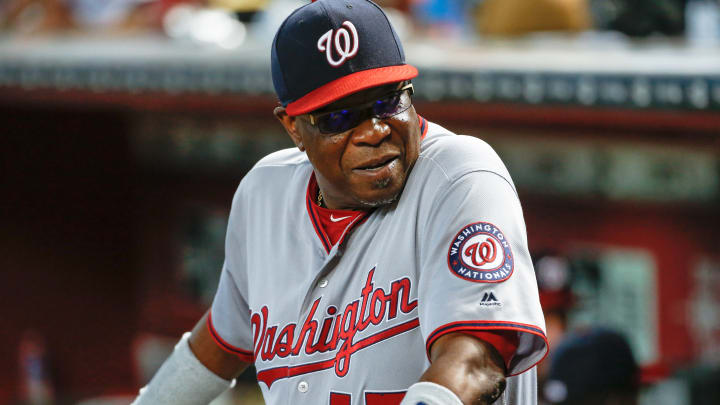The Nationals Invite Chaos Yet Again by Letting Manager Dusty Baker Go

Another high-profile manager has bitten the dust. On Friday afternoon, the Nationals announced that they would not be bringing back Dusty Baker, who has been their skipper for the last two seasons, putting him on the unemployment line alongside Terry Collins (Mets), Brad Ausmus (Tigers) and John Farrell (Red Sox). But unlike those firings, the Nationals’ dismissal of Baker feels like an unfair move and an unforced error for a Washington team that seems to reject organizational stability like a bad organ transplant.
Baker, whose contract expired after the season, was coming off his second straight NL East title in the nation’s capital, having led this year’s Nationals to 97 wins. The sheer awfulness of the rest of the division helped Washington secure that crown—second-place Miami finished 20 games back—but Baker was also forced to contend with several big injuries. He lost starting centerfielder Adam Eaton for the season in April, was without shortstop Trea Turner for months, and didn’t have the services of Bryce Harper for virtually the entire second half. He also had to deal with a horrible bullpen that torched several games in the first half, necessitating a full-blown relief corps makeover at the trade deadline.
But for all the good Baker wrangled out of that group, he and the Nationals were once again defeated by the familiar foe that is the Division Series, losing in five games to the Cubs. Unlike 2016, when they blew a 2–1 series lead to the Dodgers, this year’s Nationals dropped two of the first three, then forced a Game 5 after Stephen Strasburg’s terrific (and oddly dramatic) start. But despite taking an early 4–1 lead at home in the finale, Washington collapsed in horrifying fashion, throwing the game and series away (literally, at times) in a painful 9–8 defeat that finished them and Baker.
Dusty Baker on Dismissal: 'I'm Surprised and Disappointed'
“I’m surprised and disappointed,” Baker told USA TODAY Sports after his firing, noting that the Nationals had let him twist in the wind for over a week. “I really thought this was my best year…. It’s hard to understand.”
You can make a case for cutting ties with Baker. The Division Series loss wasn’t a strong effort, marred by his questionable decision to pull Max Scherzer in Game 3 and the circus surrounding Strasburg’s start in Game 4. Consecutive first-round postseason exits for a team with championship aspirations isn’t a point in his favor; just ask Farrell, who was dumped after Boston’s dispiriting loss to the Astros despite being the owner of a World Series ring. Baker, meanwhile, is a man who has struggled to adjust to baseball’s new era. His lineups were static and archaic; his bullpen strategy was anything but flexible; and his starting pitcher management harkened back to an older time. If any other organization had pulled the plug, this move might be questioned, but it wouldn’t seem out of line.

But the Nationals haven’t earned that benefit of the doubt. Baker is the seventh manager they’ve had in just 13 years of existence. The man he replaced, Matt Williams, nearly tore his team apart through mismanagement both on the field and in the clubhouse but was kept for two full seasons. And Baker wasn’t even Washington’s first choice to take Williams’ place when he was finally fired in 2015: Now-Rockies manager Bud Black accepted the gig, but negotiations fell apart after the Lerner family—which owns the team—lowballed him with a one-year, $1.6 million offer. After he backed out, the Nationals brought in Baker (who had already been told that he’d been rejected for the job) on a two-year, $4 million deal, or roughly half of what he’d made as the manager of the Reds in 2013.
That drama aside, Baker proved to be the right hire. Long heralded as a players’ manager, he was brought in expressly to help re-unite an unhappy roster, and by all accounts, he did that—and he also won close to 200 games and two division titles in two years. He brought a semblance of calm to a team that had thoroughly lacked it. But even with general manager Mike Rizzo reportedly in his corner, that wasn’t enough to save him. It likely didn’t help matters that, back in June, he vented to the Washington Post’s Chelsea Janes about his frustration over not getting a contract extension—a move that apparently angered the Lerners and likely sealed his fate.
It’s hard to understand exactly how the Nationals plan on doing better than what Baker already accomplished, or how canning a popular and successful manager will sit well with the players. Most important will be the reaction of Harper, who will enter the final year of his contract under his fourth manager in seven seasons. The former NL MVP will hit free agency in 2018 looking for the biggest payout in the history of the game and will have baseball’s two richest and most rock-solid franchises—the Dodgers and Yankees—eager to lavish him with cash. How much of a chance will a tight-fisted Nationals organization that burns through managers like George Steinbrenner in his prime stand against them? How eager will he be to stay in Washington, where the only constant is change?
Here, then, is the task before whomever the Nationals hire. Win over Harper. Keep a clubhouse full of veterans who liked your predecessor happy. Win the NL East, then the Division Series, then ideally the pennant and, if possible, bring home a World Series for the first time in franchise history. Do all of this despite an ownership group that won’t commit to anything long-term and will pinch pennies the entire way. And know, in the back of your mind, that anything but this level of success will likely be met with an unceremonious departure.
This Will Be Our Year: The Dodgers Finally Break Through to Clinch Long-Awaited World Series Berth
The Nationals could have chosen to stay the course with Baker and made one last run with this group—one good enough to win the World Series if everything shakes out right. Instead, they’ll court chaos and throw a new man into the fold with a one-year window and a superstar who is probably counting the days until he can leave for an organization where dysfunction doesn’t rule the day. The Lerners may talk of doing better, but all they’ve guaranteed by firing Baker is more instability and volatility when they least needed it.
For Baker, meanwhile, this move is just plain sad. No manager in baseball history has ever gotten as close to the mountaintop and never reached it as many times as he has. His career will be defined by Game 6 of the 2002 World Series, Game 6 of the 2003 NLCS, Game 5 of the 2012 NLDS and all other the clinching games his team couldn’t finish. Maybe he’ll get one more shot with a veteran team and one more chance at that elusive World Series ring. But if this is the end for Baker—he’s said he won’t retire, but at 68, his future on the bench is up in the air—then he deserved better.
